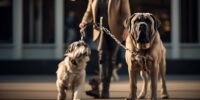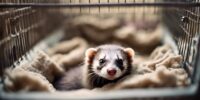How to Identify the Best Dog Breeds for Guarding Livestock
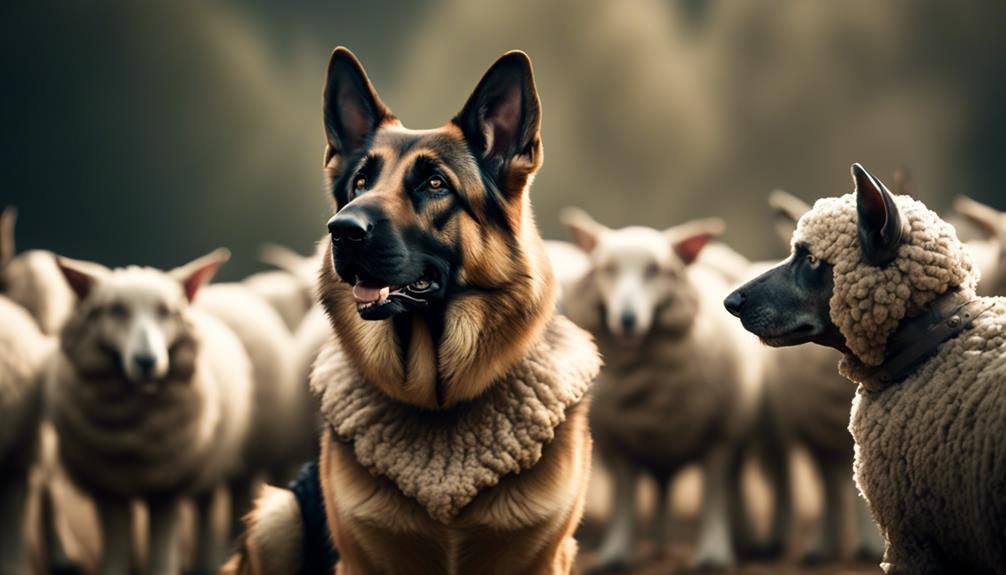
When it comes to choosing a dog breed for guarding livestock, there are several factors to consider. Firstly, you need to think about the size and strength of the breed. Larger breeds such as the Anatolian Shepherd, Great Pyrenees, and Akbash are known for their ability to deter predators and protect livestock. These breeds have a strong protective instinct and are capable of taking on larger predators such as wolves and coyotes. Secondly, you should consider the temperament of the breed. A good livestock guardian dog should be calm, confident, and independent. They should be able to make decisions on their own and have a natural instinct to protect their charges. Breeds such as the Maremma Sheepdog and the Kangal are known for their calm and composed nature, making them excellent choices for guarding livestock. Lastly, consider the breed's adaptability to different climates and environments. Livestock guardian dogs need to be able to withstand harsh weather conditions and be comfortable living outdoors year-round. Breeds like the Tibetan Mastiff and the Kuvasz have thick coats that provide protection against the elements, making them suitable for guarding livestock in various climates. In conclusion, choosing the best dog breed for guarding livestock requires considering factors such as size and strength, temperament, and adaptability to different environments. Taking these factors into account will help you find the perfect canine companion to safeguard your livestock.
Key Takeaways
- Size, strength, and adaptability are important factors to consider when choosing a livestock guardian dog breed.
- Temperament and loyalty are key characteristics that make a dog suitable for guarding livestock.
- Protective instincts are crucial in livestock guardian dog breeds, as they need to be able to protect the animals they are assigned to.
- Intelligence and independent thinking are valuable traits in livestock guardian dogs, as they need to make quick and independent decisions to protect livestock.
Key Characteristics to Consider
When considering the best dog breeds for guarding livestock, it's crucial to carefully evaluate the key characteristics that will contribute to their effectiveness in this role. Livestock guardian dogs are specifically bred to protect livestock from predators and other potential threats. There are several breeds that are well-suited for this purpose, including the Anatolian Shepherd Dog, Great Pyrenees, Tibetan Mastiff, Bernese Mountain Dogs, Kangal Shepherd, and Maremma Sheepdog.
One key characteristic to consider in a livestock guardian breed is their size and strength. These dogs need to be large and powerful enough to intimidate and deter predators. Additionally, their protective instincts must be well-developed. They should possess a natural inclination to guard and protect, without being overly aggressive.
Another important characteristic is the dog's temperament. Livestock guardians need to be calm, patient, and trustworthy. They should be able to handle the stress and responsibility of guarding livestock without becoming easily agitated or reactive.
Furthermore, a good livestock guardian breed should have a strong sense of loyalty and a protective nature. They should form strong bonds with the livestock they're tasked with protecting, treating them as part of their own pack.
Importance of Protective Instincts
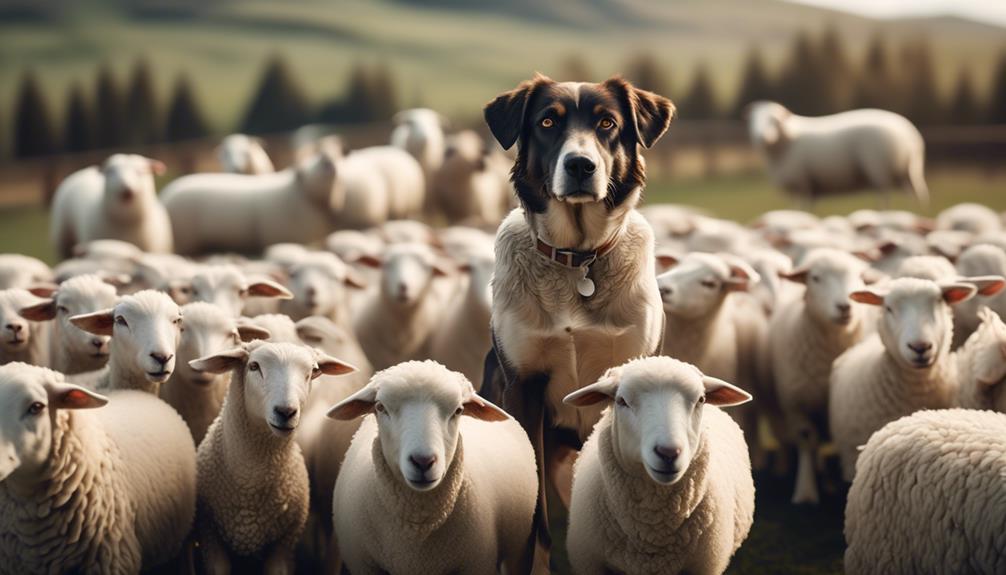
Livestock guardian dogs with strong protective instincts play a vital role in safeguarding livestock and ensuring farm security. These dogs possess a natural instinct to protect their charges, such as sheep, goats, and cattle, from potential threats. By deterring predators and intruders, these dogs can significantly minimize losses and reduce the need for lethal control methods. This is especially important for farmers and ranchers who rely on the productivity of their livestock for their livelihood.
When considering the importance of protective instincts in livestock guardian dogs, it's crucial to understand the characteristics and traits that contribute to their effectiveness. Breeds such as the Anatolian Shepherd and the Great Pyrenees are well-known for their protective instincts and loyalty to their flocks. These large dogs have a strong territorial behavior and are quick to respond to potential threats.
The protective instincts of livestock guardian dogs also extend to differentiating between family, friends, and potential threats. Proper training is essential to ensure that these dogs respond obediently to commands and only use their protective instincts when necessary. This is beneficial not only for the safety of the livestock but also for the overall farm security.
Additionally, strong protective instincts in livestock guardian dogs can help minimize stress levels in livestock. When animals feel safe and protected, they're more likely to exhibit improved productivity and require less constant supervision. This can have significant positive impacts on the overall efficiency and profitability of a farm or ranch.
Factors to Evaluate in Livestock Guardian Breeds
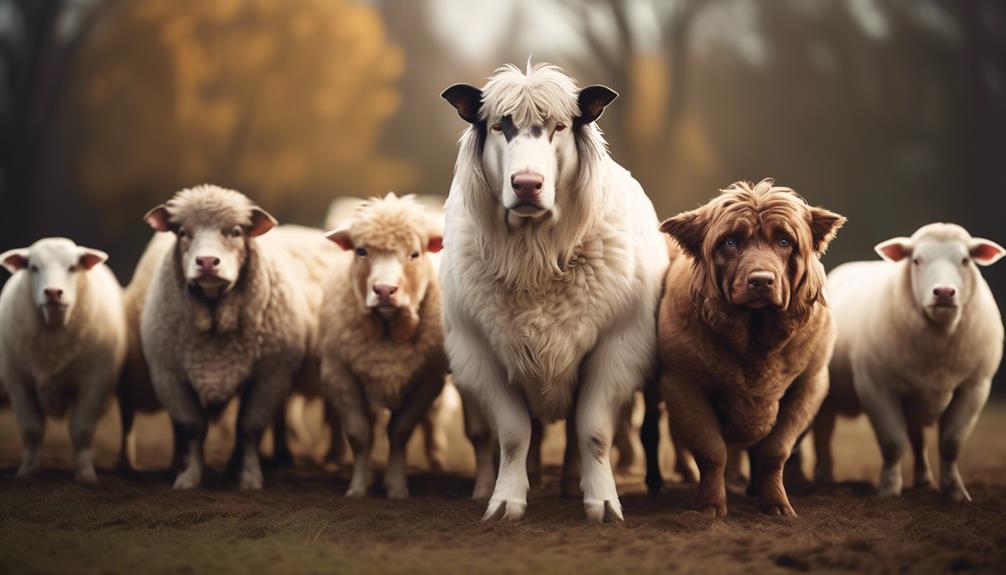
Factors to be evaluated in determining suitable livestock guardian breeds include:
- Type of animals on the farm: The first factor to consider is the type of livestock being protected. Different breeds have different instincts and abilities when it comes to guarding specific animals. For example, some breeds are better suited for guarding small animals like poultry, while others excel at protecting larger animals like cattle or sheep.
- Required coverage area: The size of the farm and the area that needs to be covered by the guardian dogs is another important consideration. Larger farms may require multiple dogs to effectively protect the livestock, while smaller farms may only need one or two dogs.
- Number of dogs needed: The number of guardian dogs needed depends on the size of the farm and the number of animals. In general, it's recommended to have at least one dog per pasture or group of animals to ensure adequate protection.
- Living arrangements and care: Livestock guardian dogs are typically large, strong, and active breeds that require ample space to roam and exercise. They also need proper shelter, regular feeding, and veterinary care. It's important to assess if the living arrangements and care requirements can be met before selecting a breed.
In addition to these factors, the availability of dog trainers in the area is crucial. Proper training is essential to ensure that the guardian dogs develop the necessary skills and behaviors to effectively protect the livestock.
Top Dog Breeds for Livestock Guarding
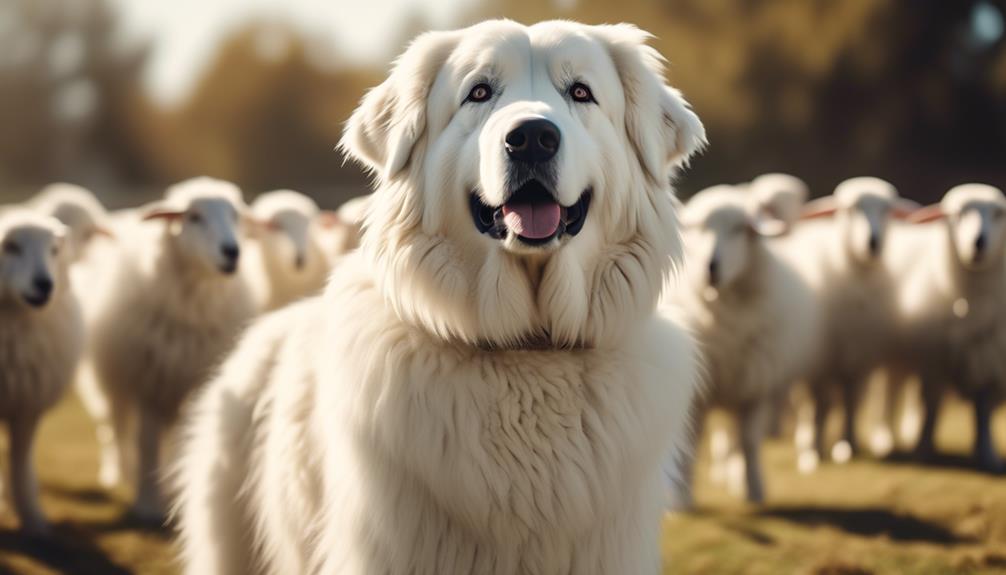
Considering the factors to evaluate in determining suitable livestock guardian breeds, it is essential to explore the top dog breeds for livestock guarding. These breeds are known for their exceptional abilities to protect livestock and are highly recommended for those seeking reliable guard dogs. To provide a comprehensive overview, the following table highlights some of the top dog breeds for livestock guarding:
| Breed | Characteristics |
|---|---|
| Anatolian Shepherds | Intelligent and loyal breed with minimal shedding and noise, making them suitable for guarding livestock. |
| Great Pyrenees | Large and regal breed known for excellent livestock guarding, although they are prone to hip dysplasia. |
| Komondor | Large and muscular breed that protects through size and aggression, requiring lots of exercise and early socialization. |
| Neva Masquerade | Bred in Russia to protect livestock, this breed showcases excellent guarding instincts and territorial behavior. |
| Maremma Sheepdog | Muscular and protective breed with a sweet and playful nature, making them ideal for protecting livestock. |
When selecting a breed to guard livestock, it is important to consider the breed standard and characteristics that align with the specific needs of the livestock. Additionally, early socialization and training are important factors to ensure the dog is reliable around the livestock they are meant to protect. By carefully evaluating these top dog breeds for livestock guarding, individuals can make an informed decision and choose the breed that best suits their livestock protection requirements.
Understanding the Role of Intelligence
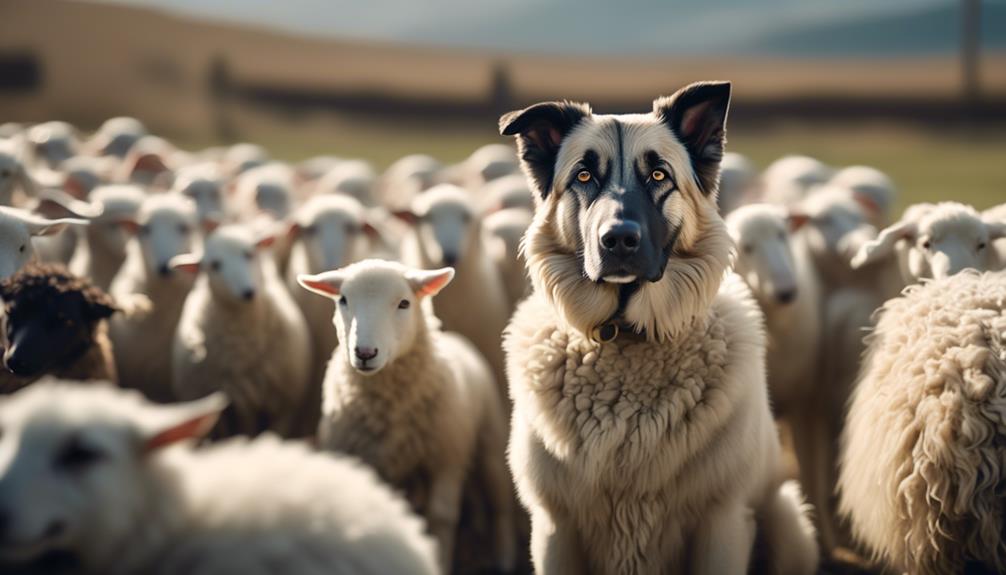
Understanding the role of intelligence is crucial when selecting a livestock guardian dog breed that will effectively protect and ensure the safety of your livestock. Dogs are known for their intelligence and their ability to learn and adapt to various tasks. When it comes to protecting livestock, intelligence plays a significant role in how well a dog can fulfill their duties.
Here are four key points to consider when evaluating the role of intelligence in livestock guardian dog breeds:
- Forming strong bonds: Livestock guardian dogs need to form strong bonds not only with their human handlers but also with the animals they're protecting. Intelligence can help facilitate the development of these bonds, as intelligent dogs are more likely to understand and respond to the needs of both humans and livestock.
- Non-aggressive behavior: Dogs that are known to be aggressive toward humans or other animals may not be suitable for the role of a livestock guardian. It's important to choose a breed that possesses the intelligence to distinguish between potential threats and harmless individuals.
- Independent thinking: Livestock guardian dogs need to make quick and independent decisions to protect the livestock in their care. Intelligent breeds are known to become more efficient at assessing situations and taking appropriate actions without human intervention.
- Training requirements: While intelligence is essential, proper training is equally important. Intelligent dogs may excel in learning and retaining information, making them an excellent choice for livestock guarding. However, they still require proper training to understand their role, follow commands, and act responsibly in different situations.
When selecting a livestock guardian dog breed, it's crucial to keep in mind the role of intelligence in their ability to protect your livestock effectively. By understanding and considering these factors, you can make an informed decision and choose a breed that possesses the intelligence necessary for the task at hand.
Loyalty as a Crucial Trait for Guardian Dogs
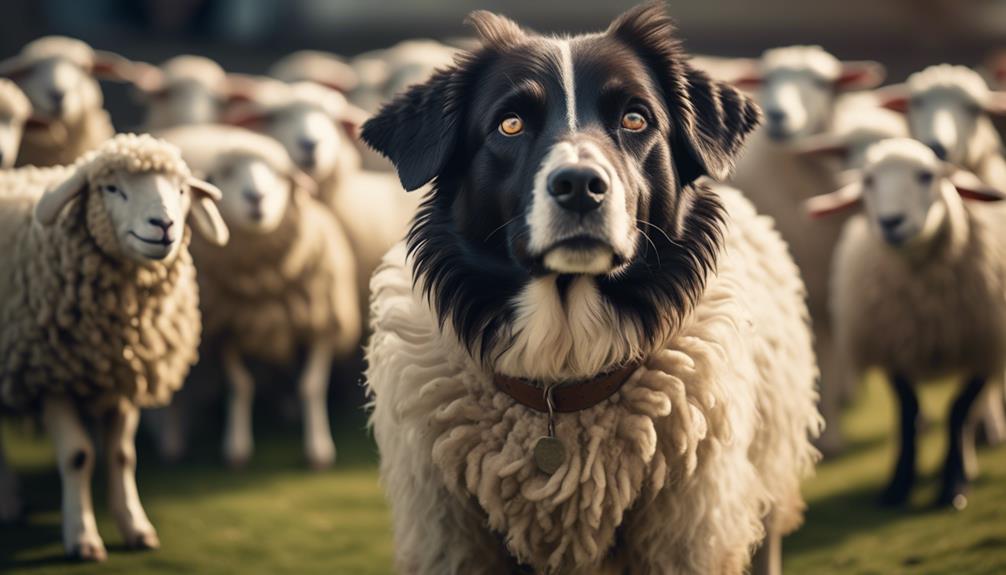
Intelligence plays a crucial role in selecting a livestock guardian dog breed. When it comes to the trait of loyalty, it proves to be equally vital in ensuring the effective protection of livestock. A loyal livestock guardian dog forms a strong bond with the animals it protects, demonstrating dedication and commitment to its duties. This loyalty ensures that the dog remains focused on its role as a protector and is less likely to be distracted or diverted from its primary responsibilities.
When choosing a livestock guardian dog, it's important to prioritize breeds known for their loyalty and dedication to their duties.
Training and socialization also play a significant role in cultivating and reinforcing the loyalty of a livestock guardian dog towards the animals it protects. These dogs have natural guarding instincts, but training helps them understand their role and develop reliable behaviors. Proper socialization exposes them to different situations and helps them become well-rounded and adaptable. This ensures that they remain loyal and protective not only towards the livestock but also towards their human handlers and family members.
Livestock guardian dogs are known for their independent thinking and their ability to make decisions on their own. However, their loyalty to their assigned livestock keeps them focused on their responsibilities. Their reliable and loyal nature makes them excellent choices for both guarding livestock and serving as family pets. Their loyalty is an essential trait that guarantees the safety and well-being of the livestock under their watchful care.
Final Tips for Choosing the Right Breed
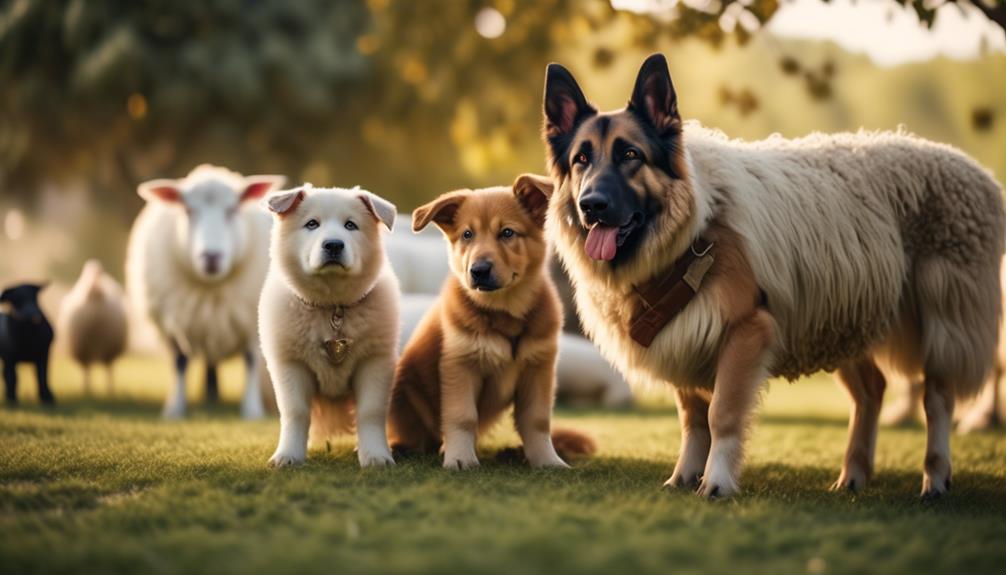
To ensure the best fit for your farm, carefully evaluate the specific needs and traits of livestock guardian dog breeds. Choosing the right breed requires careful consideration and research to ensure that the dog will be able to effectively protect your animals. Here are some final tips to help you make the right choice:
- Evaluate the behavior and compatibility of individual dogs: It's important to understand the dog's temperament and whether it's aggressive towards other animals or people. Look for a dog that can become a reliable, loyal, and protective companion for your livestock.
- Consider previous training: Dogs that have undergone professional dog training or have experience working with livestock may be better suited for the job. This training can help them develop the necessary skills to protect your animals effectively.
- Assess living arrangements and daily care: Livestock guardian dogs require proper living arrangements and daily care. Ensure that you have the resources and facilities to provide for their needs.
- Research availability of dog trainers: It's important to have access to professional dog trainers in your area who can provide guidance and support in training your livestock guardian dog. This will help ensure that the dog receives the proper training to protect your animals.
Frequently Asked Questions
How Do I Choose a Livestock Guardian Dog?
When choosing a livestock guardian dog, consider training methods, challenges, socialization, breed temperament, integration with existing livestock, differences from herding dogs, health practices, instinctual protection, suitability assessment, and maintaining a strong bond.
What Dog Breed Is Best for Guarding Livestock?
The best dog breed for guarding livestock depends on various factors such as the type of animals, living arrangements, and farm needs. It is essential to consider the breed's history, traits, and compatibility with the farm.
What Is the Gentlest Livestock Guardian Dog?
Great Pyrenees are suitable for guarding livestock due to their patient and calm temperament. Maremmas can be gentle guardians for livestock. Anatolian Shepherds exhibit a gentle temperament as livestock guardians. Komondors can be trusted as gentle guardians for livestock.
What Are the Characteristics of a Livestock Guardian Dog?
Livestock guardian dogs possess unique behaviors, protective instincts, and adaptability factors. Size requirements vary depending on the breed. Training methods and socialization needs are crucial for their development. Health considerations and longevity factors should be taken into account. Compatibility with livestock and responsible breeding practices are also important factors to consider.


